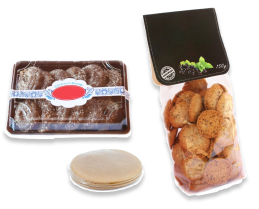OUR PRODUCTS: a recipe for sustainability
Snacks, dairy products, wine, confectionery… Here you’ll find all the essentials for creating sustainable and delicious recipes.
The project not only protects and enriches the soil but also ensures the long-term sustainability of agricultural and natural resources, contributing to climate change mitigation and biodiversity conservation. This reinforces the project’s commitment to sustainability and responsible resource management, essential for both the environment and the future of agriculture.
SNACKS
The finest selection of healthy snacks
Snack production focuses on organic raw materials and healthy nutrition, contributing to biodiversity and sustainable food consumption.
Coconut Bars: 100% vegan, gluten-free, with no additives or added sugars. Perfect for when you need a quick, guilt-free snack.
Salty Sticks: There’s nothing better than a salty snack to pair with wine, cheese, or whatever you prefer! Made with rye and spelt flours and organic ingredients. They’re delightfully crunchy with every bite.
Collagen Bars: A fusion of delightful coconut flavor, the freshness of fruit, and the benefits of collagen – elevating skin health, bolstering joint support, and reinforcing hair strength.

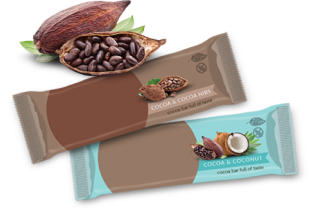
Dairy
Have you heard of Slovak bryndza? It’s a type of soft, crumbly cheese often made from sheep’s milk. It has a distinctively mild salty flavor that makes it a delightful choice for cheese enthusiasts. There’s also a spreadable version available.
Salami Cheese from the Tekov Region in Slovakia is another essential addition to our dairy section. It’s a semi-aged cheese made from cow’s milk, available in both smoked and unsmoked versions. How would you like to pair it?
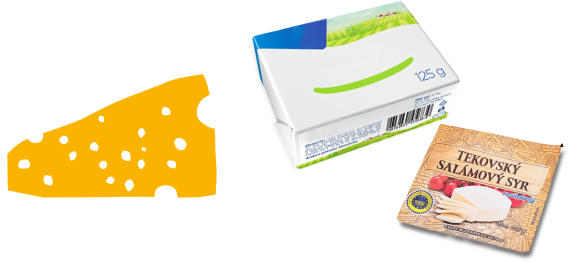
Wine
Why is wine a key ingredient in sustainable recipes?
The vineyards in the Protected Designations of Origin of Almansa, Jumilla, and La Mancha focus on indigenous varieties adapted to their specific “terroir,” such as Airén, Garnacha Tintorera, and Monastrell. These varieties have demonstrated high resistance to drought and heatwaves, contributing to biodiversity conservation and the sustainable use of natural resources.
The management of the vineyards significantly contributes to soil erosion prevention, as they are permanent crops that cover the surface and aid in carbon fixation. Vineyards act as environmental protection agents by preventing desertification and reducing the devastating effects of torrential rains. Additionally, the vineyards, being wildlife-friendly environments, allow birds, beneficial insects, and small mammals to find refuge and resources during the summer months.
Wines produced under EU production requirements embrace sustainable practices that prioritize soil health, minimize pesticide and chemical use, and employ responsible water management through efficient irrigation systems.
In our wine collection, you’ll discover choices from Spain and Slovakia, renowned for their rich winemaking traditions, native grape varieties, and their commitment to excellence.
DO Almansa Wines (Spain), featuring unique Garnacha Tintorera varieties.
DO La Mancha Wines (Spain), sourced from one of Spain’s largest grape-growing regions
DO Jumilla Wines (Spain), known for their commitment to organic cultivation.
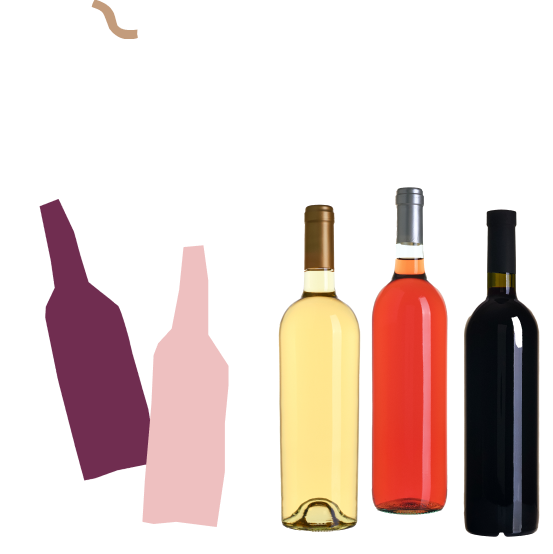
Confectionery
Nobody turns down a sweet and here, we’ll delve into our pastry products like tea cakes, chocolate, and honey plates, which serve as the perfect complement to a well-rounded basket that caters to both sweet and savory enthusiasts!
Confectionery production emphasizes using local raw materials and supporting rural employment, including sheltered workshops for people with disabilities.
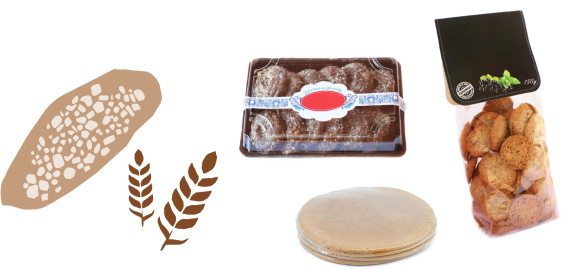
OUR PRODUCTS:
A recipe for sustainability
Snacks, dairy products, wine, confectionery… Here you’ll find all the essentials for creating sustainable and delicious recipes.
The project not only protects and enriches the soil but also ensures the long-term sustainability of agricultural and natural resources, contributing to climate change mitigation and biodiversity conservation. This reinforces the project’s commitment to sustainability and responsible resource management, essential for both the environment and the future of agriculture.
SNACKS
The finest selection
of healthy snacks
Snack production focuses on organic raw materials and healthy nutrition, contributing to biodiversity and sustainable food consumption.
Coconut Bars: 100% vegan, gluten-free, with no additives or added sugars. Perfect for when you need a quick, guilt-free snack.
Salty Sticks: There’s nothing better than a salty snack to pair with wine, cheese, or whatever you prefer! Made with rye and spelt flours and organic ingredients. They’re delightfully crunchy with every bite.
Collagen Bars: A fusion of delightful coconut flavor, the freshness of fruit, and the benefits of collagen – elevating skin health, bolstering joint support, and reinforcing hair strength.

DAIRY
The project participants support local milk producers, use solar energy, optimize production to reduce waste, and replace plastic with eco-friendly packaging.
Have you heard of Slovak bryndza? It’s a type of soft, crumbly cheese often made from sheep’s milk. It has a distinctively mild salty flavor that makes it a delightful choice for cheese enthusiasts. There’s also a spreadable version available.
Salami Cheese from the Tekov Region in Slovakia is another essential addition to our dairy section. It’s a semi-aged cheese made from cow’s milk, available in both smoked and unsmoked versions. How would you like to pair it?
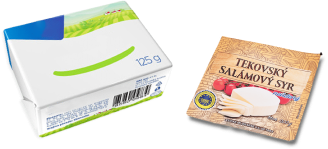
Wine
Why is wine a key ingredient
in sustainable recipes?
The vineyards in the Protected Designations of Origin of Almansa, Jumilla, and La Mancha focus on indigenous varieties adapted to their specific “terroir,” such as Airén, Garnacha Tintorera, and Monastrell. These varieties have demonstrated high resistance to drought and heatwaves, contributing to biodiversity conservation and the sustainable use of natural resources.
The management of the vineyards significantly contributes to soil erosion prevention, as they are permanent crops that cover the surface and aid in carbon fixation. Vineyards act as environmental protection agents by preventing desertification and reducing the devastating effects of torrential rains. Additionally, the vineyards, being wildlife-friendly environments, allow birds, beneficial insects, and small mammals to find refuge and resources during the summer months.
Wines produced under EU production requirements embrace sustainable practices that prioritize soil health, minimize pesticide and chemical use, and employ responsible water management through efficient irrigation systems.
In our wine collection, you’ll discover choices from Spain and Slovakia, renowned for their rich winemaking traditions, native grape varieties, and their commitment to excellence.
DO Almansa Wines (Spain), featuring unique Garnacha Tintorera varieties.
DO La Mancha Wines (Spain), sourced from one of Spain’s largest grape-growing regions
DO Jumilla Wines (Spain), known for their commitment to organic cultivation.
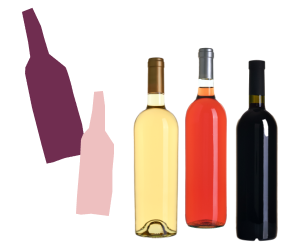
Confectionery
Nobody turns down a sweet and here, we’ll delve into our pastry products like tea cakes, chocolate, and honey plates, which serve as the perfect complement to a well-rounded basket that caters to both sweet and savory enthusiasts!
Confectionery production emphasizes using local raw materials and supporting rural employment, including sheltered workshops for people with disabilities.
